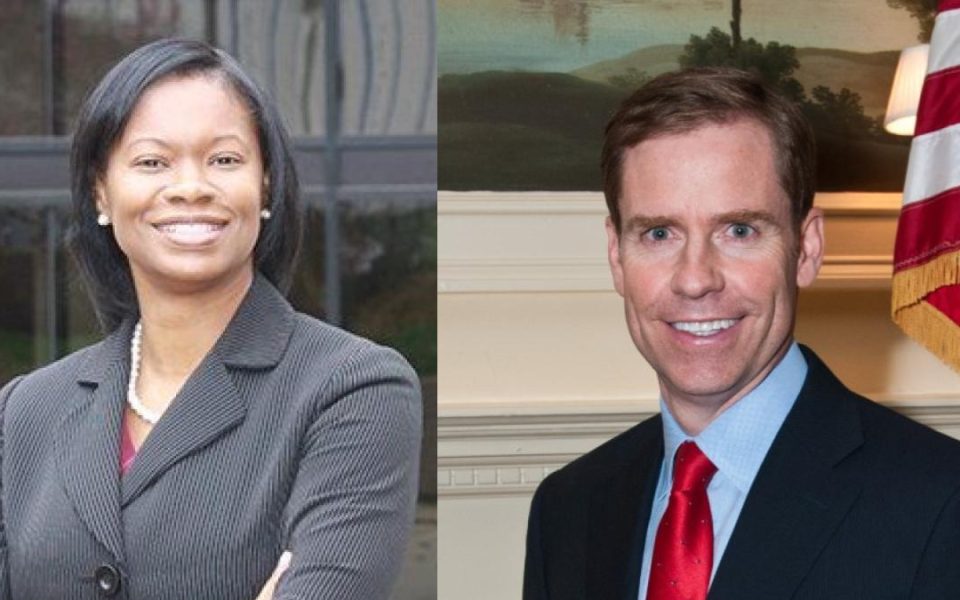Featured Photo: District Attorneys Avery Crump (left) and Jim O’Neill (right) are responsible for combing through tens of thousands of names before they can expunge past records.
North Carolina’s Second Chance Act will soon expunge hundreds of thousands of juvenile criminal records.
Originally passed with unanimous bipartisan support in June 2020, the law allows district attorney’s offices to purge non-violent offenses on North Carolinians’ criminal records if those charges landed when they were under the age of 18, even if they have accrued additional felony charges in the interim.
Along with the Second Chance Act, or SB 562, North Carolina also passed SB 301 this session, which allows more people to be eligible for expungements. For example, a person with five misdemeanors and one DWI could not previously clear the misdemeanors from their records.
“I was proud to see the act become law,” said Sen. Michael Garrett (D-Guilford), a cosponsor on the bill. “Sometimes folks make mistakes, and it keeps them from different opportunities. The Second Chance Act allows their records to be expunged so they don’t face those barriers for the rest of their lives.”
For people with one charge or multiple nonviolent charges in one county, their records will be expunged automatically once the district attorney offices in each county have the official lists of who qualifies. However, there are still a few barriers for some who may have multiple charges.
“If you have multiple charges in a case, you still need to petition for those to be expunged,” said Ayana Robinson, the head of the Second Chance work at Legal Aid. If filing in multiple counties, those petitions all need to be filed within 30 days of each other, she explained.
Robinson emphasized her support of the bill and how much the laws in North Carolina have changed over the last few years, but she also noted the difficulties still in place.
“We are 100 counties doing it 206 different ways,” she said. “Because we don’t have a unified court system, each county is doing it differently. In one county, I can go to the clerk and I’m good, and then in another I have to get a judge to sign.”
Each county also has to clear their lists to make sure everyone on it is eligible for expungement. Guilford County District Attorney Avery Crump currently has a list of 27,000 defendants with cases dating back to 1978. Not all of them are eligible even under the Second Chance Act.
Crump and Forsyth County District Attorney Jim O’Neill are both working toward clearing their lists, but as Crump said, the process will take some time.
“It’s great because it takes the burden away from defendants who may not be able to afford a lawyer to have something expunged,” she said. “Going forward, cases will get automatically expunged. We won’t have to do as much work. But those other cases, we have to make sure those cases qualify.”
Coming together for criminal justice reform
While it is technically illegal to discriminate against people with criminal records in hiring, there are many clauses that make it easy to find loopholes according to the National Conference of State Legislatures.
Likewise, landlords and the like can deny housing for a person with a criminal history if they believe the person is a risk to neighbors, according to the Fair Housing Center for Rights & Research. The discrimination hits marginalized communities, such as those who are Black and Brown, in particular because of the disproportionate numbers of those incarcerated.
Sen. Mujtaba Mohammed (D-Mecklenburg) was one of 13 co-sponsors on the original bill, including Sen. Gladys Robinson (D-Guilford). Sen. Danny Britt (R-Columbus) and Sen. Warren Daniel (R-Caldwell), two of the primary sponsors on the bill, are Republican and former Sen. Floyd McKissick (D-Durham), the third primary sponsor, was a Democrat. Other sponsors come from both parties.
“Despite what’s often out there, there’s a lot of collegiality between Republicans and Democrats on legislation,” said Britt. “Criminal justice reform is one of those things I think we do a good job of coming together on.”
Sen. Britt also hopes to expand on the areas the bill does not cover. Right now, breaking and entering, possession with intent to sell and distribute cocaine and assault are charges that will not be automatically expunged.
“That person could go 30 or 40 years with no other charge, but that is something they cannot have taken off their record,” he said. “I’ve always felt like folks who have been exonerated or had charges dismissed should not be strapped with a charge.”
Getting the automatic expungements rolling will likely take several months, but Laura Holland, the project director of the NC Justice Center’s Fair Chance Criminal Justice Project, has already seen a real-life impact on her clients.
“It allowed us to not have to turn anyone away,” she said. “It allowed more people to be eligible. And then of course, it allowed for the automated expungement for dismissed charges. It’s going to allow people to get relief.”
One of Holland’s recent clients had been shut out of food stamps, housing and employment because of previous charges. He is 45 and has eight kids between him and his wife. Because of the bill, he was able to expunge that record.
“All his charges were nonviolent charges,” Holland said. “He’s able to have opportunities that were kept from him in the past.”
Another recent client was not able for expungement at all until the bill.
“He had a number of misdemeanors and one felony charge, and because of the felony he couldn’t get rid of any of them,” she said. Holland was relieved to be able to tell him about the bill.
Sen. Mujtaba Mohammed (D-Mecklenburg), another co-sponsor of the bill, called the new law “life-changing” for his clients. Mohammed is also a practicing attorney and has seen many of his clients in similar positions to Holland’s clients.
“There are folks who don’t have the time or knowledge to clear their names,” he said. “Now, we can do that in North Carolina.”
For those who may be eligible for expungement under these new laws, they can call Legal Aid at their state-wide, toll-free number, (866) 219-5262.
Join the First Amendment Society, a membership that goes directly to funding TCB‘s newsroom.
We believe that reporting can save the world.
The TCB First Amendment Society recognizes the vital role of a free, unfettered press with a bundling of local experiences designed to build community, and unique engagements with our newsroom that will help you understand, and shape, local journalism’s critical role in uplifting the people in our cities.
All revenue goes directly into the newsroom as reporters’ salaries and freelance commissions.


Leave a Reply